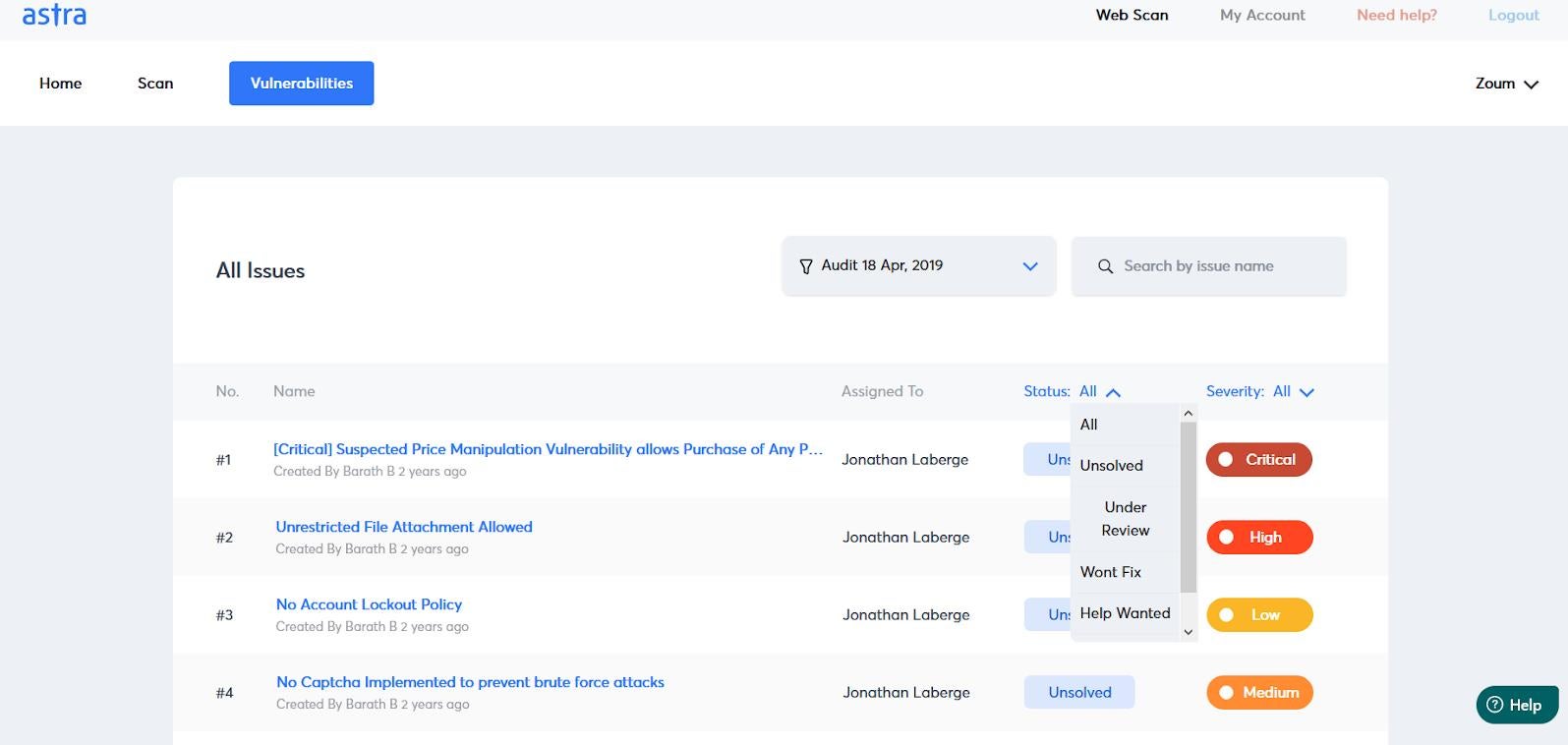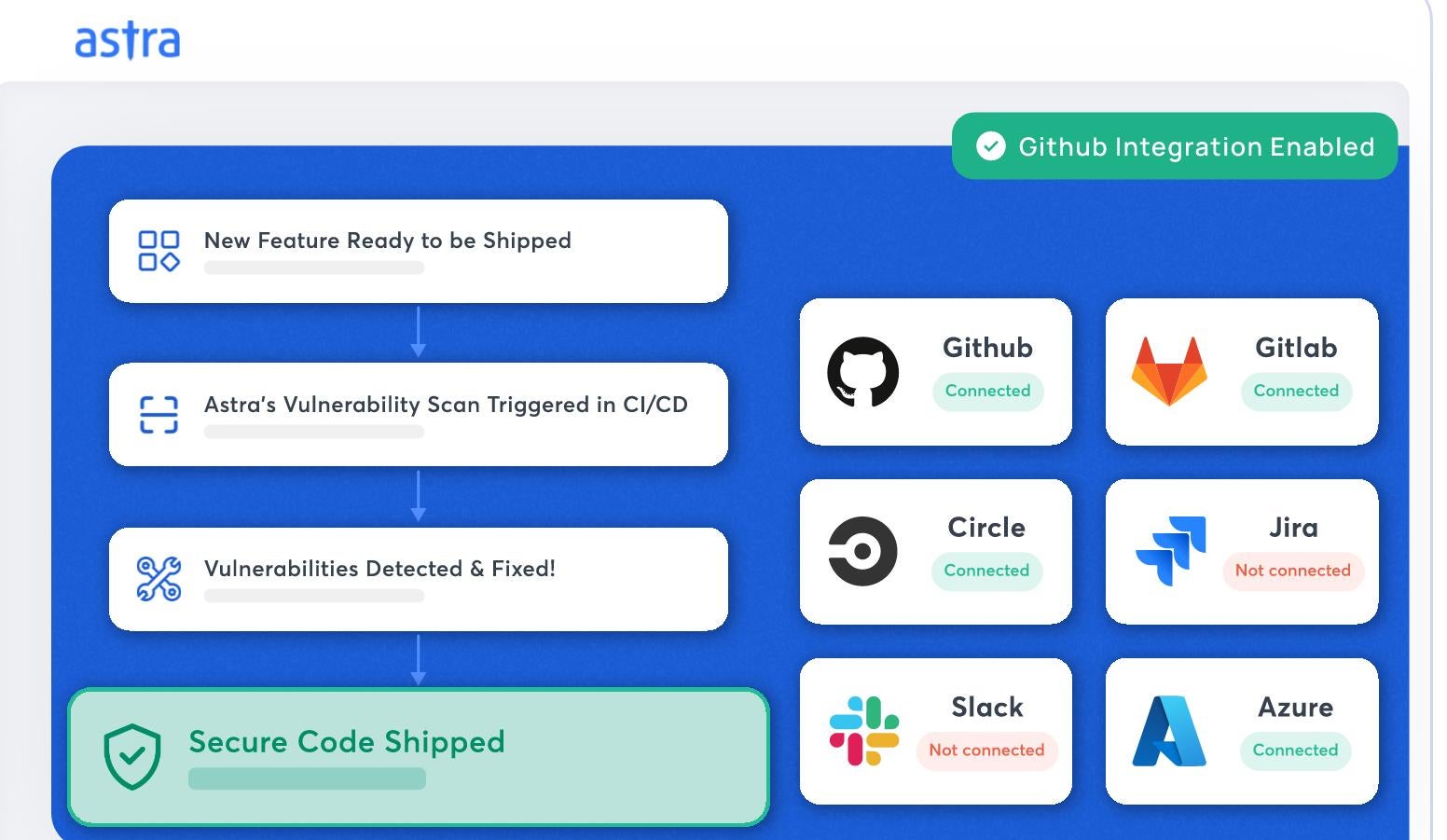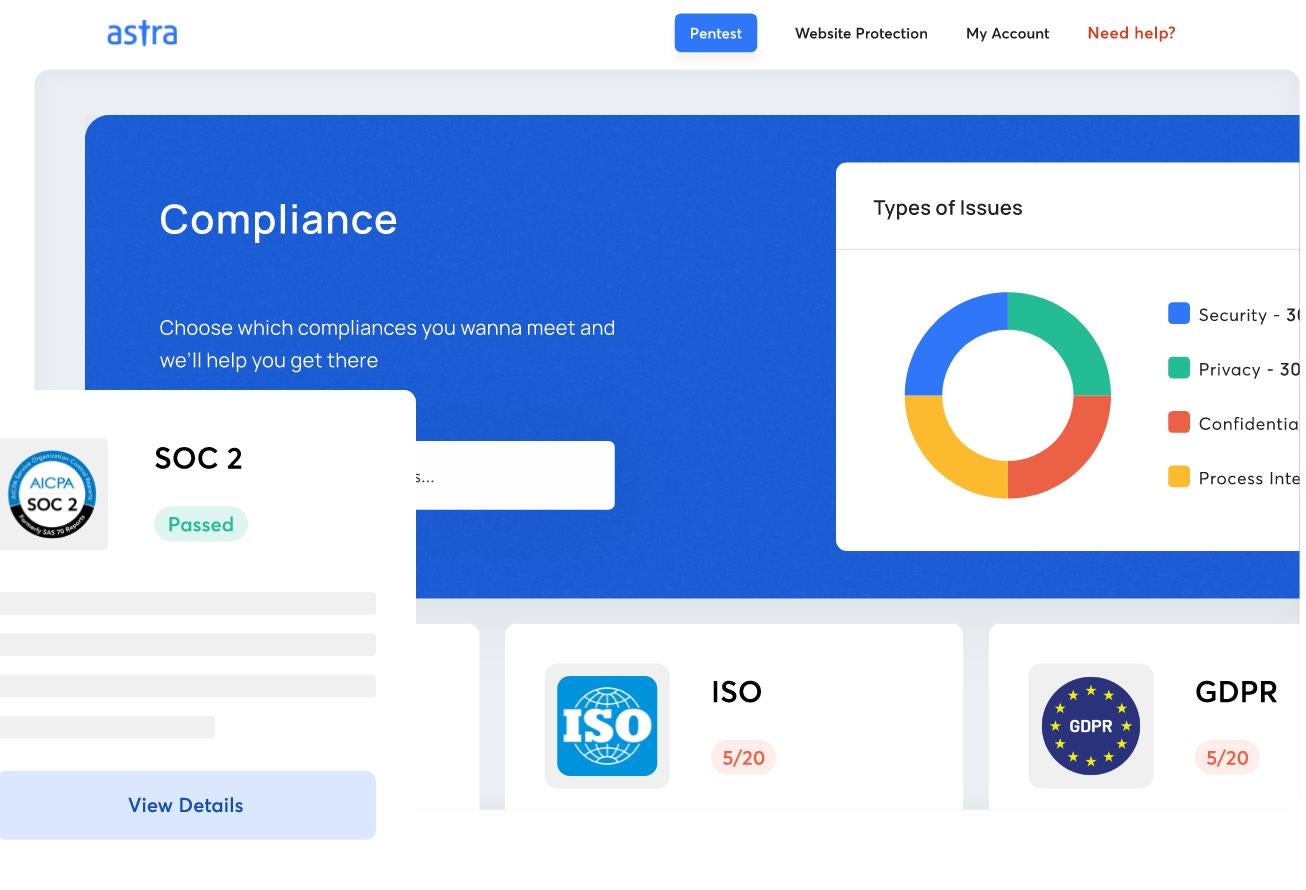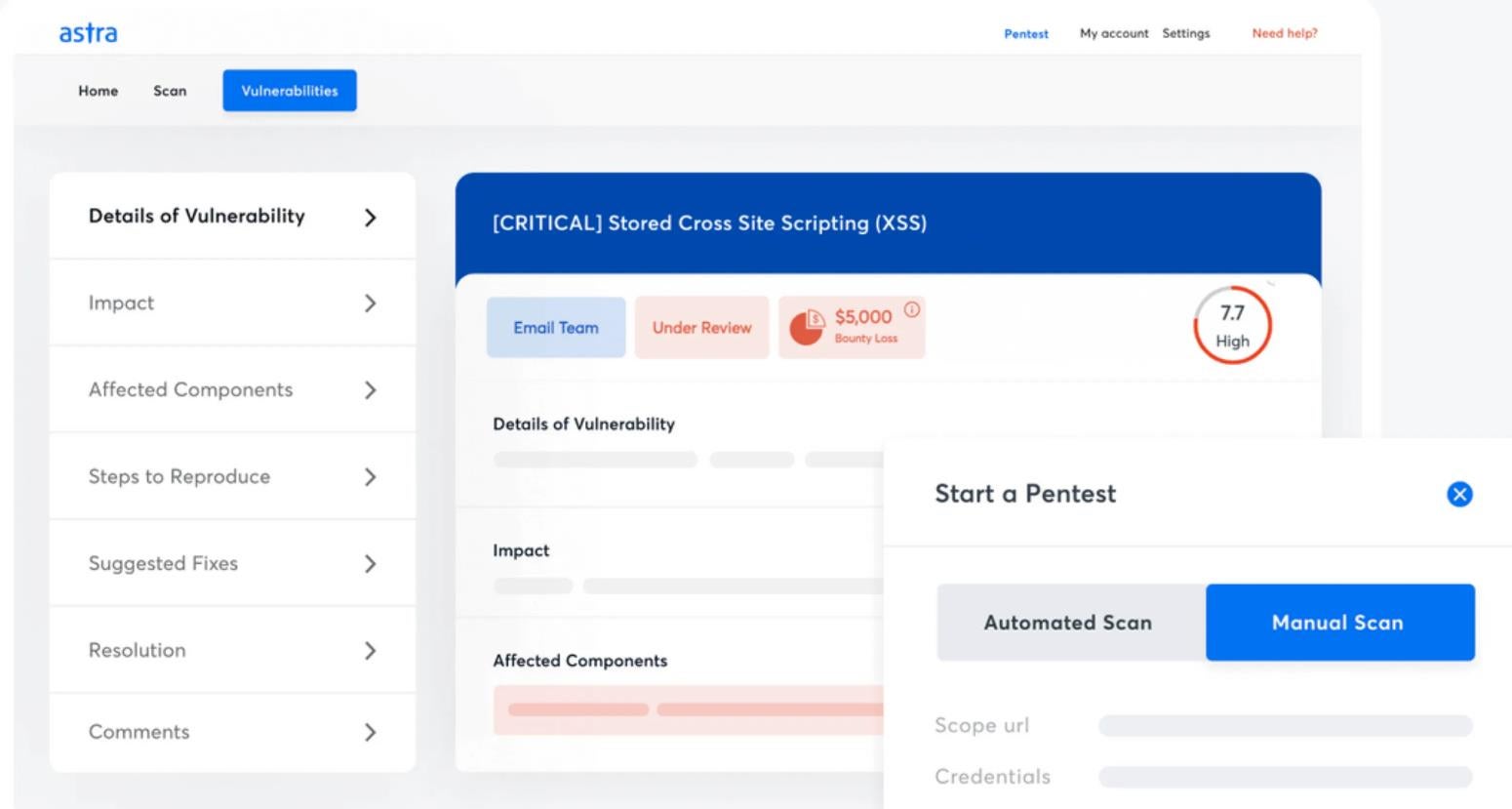Astra Security’s fast factsStarting price: $199 per target per month Key features
|

Astra is one of the few security companies that combines automated and manual penetration testing (pentest) to create all-in-one security solutions. The platform can run over 9,000 tests and integrate with CI/CD tools to establish DevSecOps. Astra’s security checks include — Web App Pentest, Cloud Security Pentest, Mobile App Pentest, and API Pentest.
While Astra Security is more expensive compared to similar solutions like Wireshark and Kali Linux, its dynamic vulnerability management dashboard can manage, monitor, assign, and update vulnerabilities better than most competitors.
Featured Partners
Astra Security pricing
| Plans/platforms | Web app | Mobile app | Cloud security |
|---|---|---|---|
| Scanner | $199 per month or $1,999 per year (monthly and yearly billing options) | N/A | N/A |
| Pentest | $5,999 per year (yearly billing only) | $2,499 per year | N/A |
| Enterprise | $9,999 per year (yearly billing only) | $3,999 per year | N/A |
| Basic | Not Available (N/A) | N/A | Direct quote (Requires speaking to sales) |
| Elite | N/A | N/A | Direct quote (Requires speaking to sales) |
| Free trial | Can try for $7 for a week | N/A | N/A |
Astra offers no free trial for its customers. However, it does have paid plans for web apps, mobile apps, and cloud security users, and some of them cover both vulnerability scanning and penetration testing.
Web app plans
Astra has subscriptions for web apps, including plans for scanning, pentest, and enterprise.
Scanner: Costs $199 per target monthly or $1,999 per target per year. Users can enjoy unlimited vulnerability scans with 9,300+ tests and unlimited integrations with some third-party tools. Plus, it has AI-powered fixing assistance. One thing I like about this plan is that users can try it at a lower price — $7 a week — before committing their money.
SEE: The 8 Best Penetration Testing Tools for 2024 (TechRepublic)
Pentest: Costs $5,999 per target per year, billed only yearly. Covers everything in the Scanner plan, plus cloud security review, compliance reporting, and publicly verifiable pentest certificate.
Enterprise: Best for diverse infrastructure, costs $9,999 per year for multiple targets. Covers everything in the Pentest plan, plus Customer Success Manager, support via Slack Connect or MS Teams, custom SLA/contracts, and a three-month rescan period.
Mobile app plans
This comes in two subscription plans — Pentest and Enterprise.
Pentest: Priced at $2,499 per target per year. Benefits include one vulnerability assessment and penetration test, 250+ test cases, and expert support.
SEE: What Is Cloud Penetration Testing & Why Is it Important? (TechRepublic)
Enterprise: Starts from $3,999 per target per year. Covers everything in the Pentest plan, plus multiple targets, CSM, and custom SLA/contracts.
Cloud security plans
This is offered in two plans — Basic and Elite.
Basic: Requires custom quote by speaking to sales. Some of the benefits include 180+ security tests, IAM configuration review, and one rescan.
Elite: This also requires that you get a custom quote by speaking to sales. It covers everything in the Basic plan, plus five team members, two re-scans, and expert support.
Astra Security’s key features
As part of the suite, Astra Pentest and Astra Vulnerability Scanner work together to offer continuous vigilance, security posture analysis, and other capabilities. Here are some Astra features I found very interesting.
SEE: Vulnerability Scanning vs Penetration Testing: What’s the Difference? (TechRepublic)
Vulnerability scanner
Astra’s vulnerability scanner can perform up to 9,300 tests, including checking for known CVEs, OWASP Top 10, and SANS 25. When I used the tool to scan for progressive web apps and single-page apps using the one-week trial, I noticed the scanner analyzes pages behind my login screen to ensure every possible area of my application is secure. One thing I like about this feature is that you can also purchase it separately as a plug-and-play software that requires zero to little human involvement.

Continuous scanning through integration
Astra’s Pentest can allow you to move from DevOps to DevSecOps through integration with CI/CD platforms. This means you can automate scans so that every code update is preceded by a hacker-style security test. I noticed during testing that Astra makes it easy to track scanning progress via Slack and to collaborate and flag vulnerabilities through Jira. You can connect your Jira account to a project in just a few clicks.

Vulnerability management dashboard
This is a feature that takes Astra a notch higher than most of its competitors. Astra can allow you to have full visibility into your pentest so you can understand the key metrics of each vulnerability. When using the dashboard, I realized that Astra has taken some common customer pain points very seriously while designing the UX. Also, I noticed you can centrally manage the team members who have access to your various targets. Another thing is that you can speak to the Astra-naut bot 24×7 and get instant answers to security-related topics.

Manual pentest
This feature is included in Astra’s top plan, and it can take care of your business logic errors and issues that are undetectable by an automated scanner. Astra does this by using AI to emulate the hacker mindset and identify scenarios of business logic vulnerabilities in applications. Apart from testing for business logic errors, Astra’s manual pen testing also tests for things like blind SQL injection, payment manipulation vulnerabilities, and template injection.

Astra Security pros
- Scans your assets with 9300+ tests.
- Can check for ISO 27001, HIPAA, SOC2, or GDPR compliance.
- The dashboard allows you to track your team’s progress with smart reporting.
- Offers a unique, publicly verifiable security certificate.
- Unlimited integrations with CI/CD tools, Slack, Jira, and more.
SEE: How to Run a Cybersecurity Risk Assessment in 5 Steps (TechRepublic Premium)
Astra Security cons
- No free trial.
- The monthly subscription is only available in the Scanner plan.
- Can be expensive compared to the competitors.
Alternatives to Astra Security
| Astra Security | Acunetix | Metasploit | Kali Linux | |
|---|---|---|---|---|
| Starting price | $199 per target per month | Pricing is not available. Requires a private quotation | Free for Metasploit Frame but requires a quote for Metasploit Pro | Free |
| Third-party integration | Yes | Yes | Yes | Yes |
| Vulnerability test | 9,300+ | 7,000+ | No information | 600+ |
| Free trial | No | No | Yes | Completely Free |
| Deployment | Cloud-based | On-premise/Cloud | On-premise/Cloud | OS/Live boot |
Acunetix
Acunetix by Invicti is a powerful pen-testing tool for web applications. While Astra offers both vulnerability scanning and manual pen testing together, Acunetix is best suited for pentest automation. I like that Acunetix comes with a dashboard that can sort vulnerabilities into classes, such as critical, high, medium, and low. It also allows unlimited users and scans.
Metasploit
Metasploit is another reliable alternative to Astra Security. The fact that Metasploit offers both an open-source and commercial option provides the customer with the choice of what type of pen testing solution they require. The 30-day free trial of the tool is a big advantage over Astra Security, which doesn’t offer any free trial. While the framework version is limited in functionality, its simple web interface and free edition for developers and researchers mean it’s still in a good position to compete with Astra Security.
Kali Linux
Kali Linux is an open-source pen testing solution that runs on the Debian-based Linux distribution. It is built for mostly advanced users who understand command-line prompts. I particularly appreciate how the brand is upfront in saying that the tool is made for veteran pen testers and experienced Linux users, not everyday consumers. While the tool only supports about 600 penetration testing utilities, its completely free pricing means it’s a good alternative for those who don’t have the finances to procure Astra Security.
Methodology
I reviewed this product using two criteria — hands-on experience with the tool and information from Astra Security’s official product documentation, user reviews, and case studies. During testing using the $7 one-week trial, I noticed the scanner analyzes pages behind my login screen to ensure every possible area of my application is secured. Astra can also allow you to have full visibility into your pentest so you can understand the key metrics about each vulnerability, and that’s something I like in any security solution — complete visibility. Its user-friendly dashboard also allows for tracking of teams’ progress with smart reporting. I was also able to establish support with the Astra-naut bot 24×7, which gave me instant answers to security questions. All these factors informed our decision to rate the product among the best vulnerability scanners in 2024.




